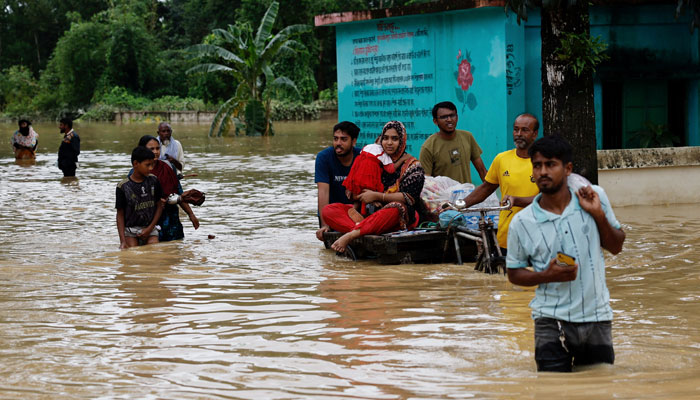
At least five people have died and over 100,000 remain stranded as devastating floods, triggered by heavy rains and upstream torrents, continue to ravage northern Bangladesh, officials said on Sunday.
In Sherpur, one of the hardest-hit northern districts, the water levels of major rivers have surged, submerging new areas and displacing thousands of families.
Local authorities fear widespread damage to agriculture, with crops and farmlands, particularly rice fields, facing potential devastation. Many homes and roads are under several feet of water, cutting off villages and leaving residents in desperate need of rescue.
“I have never seen such flooding in my life,” said Abu Taher, a resident of the district.
Army personnel, using boats and helicopters, have joined rescue efforts, delivering emergency supplies and evacuating those trapped by the floods.
Bridges have collapsed, and roads have been submerged, making it difficult for local authorities to reach affected areas.
“Our priority is to evacuate people to safe shelters and provide them with essential supplies,” said Sherpur district administrator Torofdar Mahmudur Rahman.
He said another decomposed body, suspected to have floated from India, had been found.
The low-lying nation of 170 million has experienced multiple floods this year, underscoring its vulnerability to climate change.
A 2015 World Bank Institute analysis estimated that 3.5 million people in Bangladesh are at risk of annual river flooding, a risk scientists say is worsening due to global climate change.
As water levels continue to rise, concerns grow about the long-term impact on the region’s agriculture, particularly rice crops. If the floodwaters do not recede soon, the economic toll on farmers could be severe.
Adding to the worries, the weather office has predicted more rain in the coming days, raising fears of further inundation.
The latest floods come months after eastern Bangladesh was devastated by floods in August, leaving more than 70 dead. The floods caused damage estimated at $1.20 billion, according to a study by the Centre for Policy Dialogue, a leading think-tank.
The United Nations and its partners have launched a $134 million humanitarian appeal to provide urgent relief and support to communities affected by ongoing floods and cyclones in Bangladesh.
